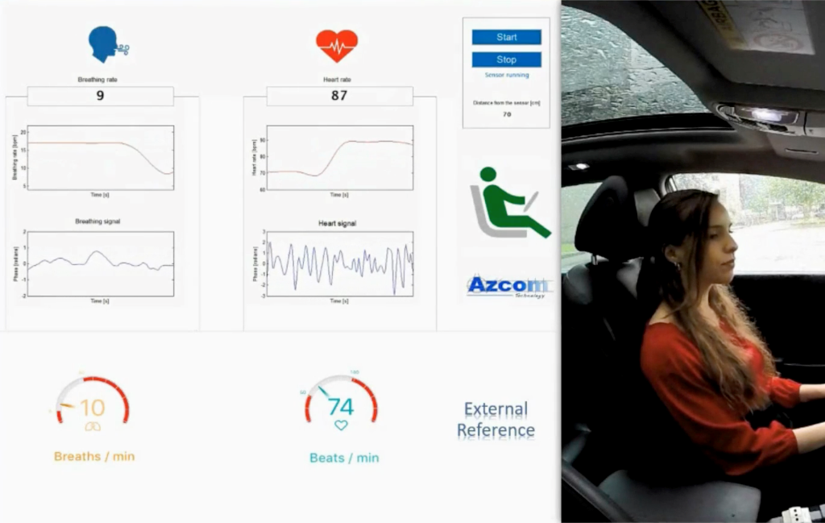SPRY346 March 2022 AWR1843 , AWR1843AOP , AWR2243 , AWR2944
Driver monitoring for ADAS
Radar sensors are not only changing the way that vehicles sense the environment around them, but also how radar senses what is inside them.
The capabilities of radar sensor such as AWR6843AOP for in-cabin sensing continue to grow, increasing the accuracy of systems such as driver monitoring systems, seat-belt reminders and airbag deployment, better serving the vehicle’s occupants. Heavy objects laid on a seat will no longer trigger seat-belt reminders. Airbags could deploy at different speeds when children are present in the car, reducing the risk of impact injuries. Drivers could receive reminders that infants or children are still inside vehicles, since radar detects lifeforms with higher accuracy and reliability than any other sensor technology out there.
A radar sensor can also accurately detect when a driver becomes drowsy by estimating their heartbeat and breathing rate with reliable accuracy as shown in Figure 7. One single sensor has the ability to monitor vital signs for all occupants inside a car – information that the vehicle can then use to identify potential medical abnormalities and potentially alert occupants, especially driver alert status. Once warned, drivers could take appropriate actions such as taking a break or pulling over in the event of a medical issue.
 Figure 7 Demonstration of heart rate
and breathing estimation using 60-GHz mmWave radar. (Source: Azcom
Technologies).
Figure 7 Demonstration of heart rate
and breathing estimation using 60-GHz mmWave radar. (Source: Azcom
Technologies).Also, today drivers have to take their eyes off the road in order to adjust various comfort and convenience functions through button switches or knobs. A radar sensor can detect gestures such as a swipe of a hand or twirl of finger. A hand swipe from right to left could indicate that the user wishes to change radio stations, while a twirl of a finger in an anti-clockwise direction could mean decrease the volume or zoom out on a navigation map, greatly simplifying the driving experience. Passengers in the second row could also browse movie selections on headrest screens with a swipe of a hand, rather than having to extend their hands toward the screen to touch a knob.
Thus, radar sensors are redefining the interior sensing mechanism inside vehicles by assisting drivers and passengers and also providing comfort functions.